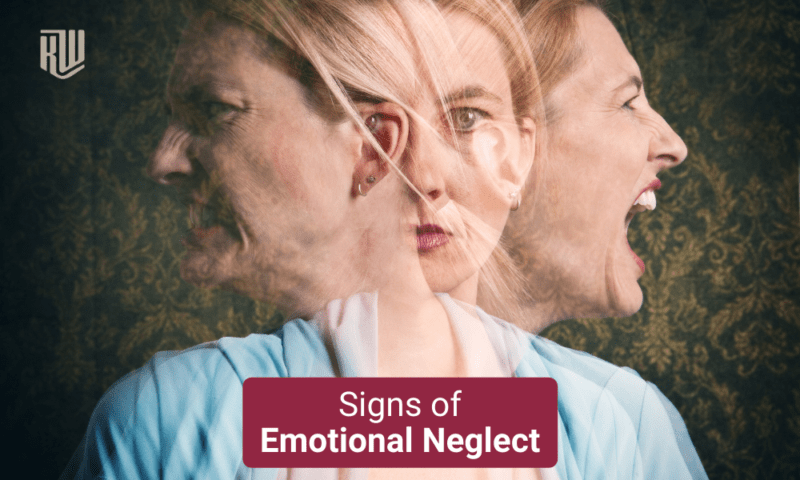Childhood emotional neglect can show up in your life in 15 ways. Contrary to belief, we may think some signs are “proof” that we didn’t experience childhood emotional neglect, but they are proof that we did.
What creates emotional neglect? When a parent doesn’t meet a child’s attunement needs. The child’s attunement needs are often repeatedly ignored, or their feelings are invalidated. As loving parents, we may say we love our children; although we say it, children may not just know that we love them. For our children to not feel emotionally neglected, they require focused emotional attention. The best way to describe that is the ability to, as a parent, defer your life stress, relationship problems, addiction problems, emotional problems, everything that we adults usually struggle with, and be entirely emotionally present for your child. Basically, “Hey, I’m here for you.”
Childhood Emotional Neglect
Let’s be honest; most of us parent with other things on our minds. We’re constantly multitasking. We’re running businesses, pleasing our spouses, feeding the dogs, and doing all these things where we are just dragging our kids along. So then the attention is no longer considered focused attuned attention, more like co-opted attention or multitasking attention. That contributes to the feeling of emotional neglect. Our children are a partial thought and many times an afterthought.
That is why I say, in my experience, I have yet to meet a single person who has not experienced childhood emotional neglect. Although some may argue that they didn’t experience emotional neglect, it’s just not possible. We’re all human, and every parent, at times, will try and multitask their parenting, and when they do that, they are emotionally invalidating and ignoring their child’s attunement needs. It doesn’t make parents bad parents. It is just a fact of life, parenting is hard, and life has many demands. Therefore this isn’t about blame. It is about admitting the truth and taking responsibility. So now that we are in reality and recognize this is a universal dynamic let’s get into the characteristics.
What are some characteristics that show up as an adult?
1- Few childhood memories
Having big blank spots in our childhood, memory is a prevalent indicator of emotional trauma. It’s a self-defense technique, a dissociative technique. To dissociate, we block things out. We don’t want to feel the pain of those moments, so we have big blank spots. The reality that most people remember very little of their childhood shows how prevalent neglect is for us all.
2. Saying, “I don’t know a lot.”
This tells us that, as a child, the parent did not allow the child to express or choose their morals, values, needs, wants, negotiables, and non-negotiables. That is why subconsciously, they feel as though they aren’t allowed to make a choice, even as adults.
3. Perfectionism
We all know what that means, believing that we won’t get any attention if we’re not perfect. Perfectionism is a direct attempt to avoid feeling worth “less.”
4. Feeling Blank, numb, empty.
70% of the population does not feel, which shows us that 70% feel detached and dissociated from their childhood emotions. Dissociating from feelings of neglect for many is their only solution.
5. Low Self-Esteem
How are we expected to have high self-esteem when our parents were imperfect and couldn’t attune to us because of multitasking and having other things on their minds? Not that we weren’t loved, but it just happens to be the case that parenting requires a lot. Unfortunately, the defense mechanism was to blame themselves when something couldn’t be fixed in their life.
6. Can’t ask for needs and wants or help
When our parents are too busy to attune to us, they invariably ignore our needs and wants. Therefore as a child, we learn to ask is to be rejected. This becomes an ingrained belief. Now, as adults, when the prospect of making a request presents itself, we become blank, numb or terrified.
7. Can’t say no or feel guilty for saying it. People pleasers
Because we had to put our needs and wants aside, many of us became people-pleasers because we also weren’t allowed to say no! When we did, usually around the age of two, it was followed by punishment. As an adult, there is a direct correlation between saying no and punishment.
8. Relationship instability – fear rejection, reject others easily.
Is relationship stability possible? Or have older generations with 60-yearlong marriages just found a way to suffer through intolerable pain with each other? Most of us have been through a marriage, multiple marriages, or breakups after just 6 months to a year. We learn how to have relationships from our parents and childhood relational environment. That shows us how emotionally abandoned we all are. As a result, people with relationship instability will fear rejection or reject people easily. Easily rejecting people shows that a person is dealing with false empowerment and detachment and they were never present in the relationship. That maladaptive coping skill is learned in childhood. Typically, our society celebrates and promotes the falsely empowered side as success. Most are unaware that it’s just as dysfunctional and results from emotional hurt.
9. Believe they can change a person.
As adults, we place ourselves in a God-like position when we believe that we really have enough power over someone to make them change. We even stay in abusive relationships because we assume we can change someone. All because of the severe emotional neglect that we had to cover up with false power as a child.
10. Stay so busy they can’t feel.
I love Gary Vaynerchuck, he’s a beautiful human being who’s done a lot to help people, but when you hear him talk about his childhood, you’ll find that it was brutal. He has many businesses and keeps himself busy, he never sleeps, and I believe this is done so that he doesn’t have to feel he is running from the pain of his childhood. So many of us keep busy with activities, parenting, working out, careers, etc., but it’s always extreme, so the pain from childhood isn’t felt.
11. Grandiose – Better than/false esteem.
Again, this stems from the false empowerment side. Usually shown by successful athletes, actors, politicians, and those we say have “succeeded.” The internal subconscious belief is that I have become something if I achieve these things and am now worthy of love. I am no exception. Part of my career is based on this; however, I have to remind myself to stay accountable and that this is one of the falsely empowered ways to deal with my emotional neglect.
12. Domineering and controlling
This is a sign of success, the newly emerging “boss bitch babe” and the classic “dominant controlling man” not taking anything from anybody. But, remember, this is hiding something. It disguises how small and insignificant we can feel. This holds true for me, too; remember, I am pointing my finger at myself first. I’ve had to tear myself down and realize this also relates to me.
13. Success or achievement-oriented
Do you often wonder why some successful or wealthy people are the most miserable or take their own lives? They’re feeling tremendous neglect and covering over it by pursuing outside esteem to fill the hole within themselves. True success is the ability to overcome our demons, whether or not we have the money or accolades. It’s internal, not external. Unfortunately, people who have suffered childhood neglect and have not healed are pursuing the external.
14. Critical and judgmental
I have several videos that may be a little critical and judgmental, I try my best to be kind and loving, but I am giving critiques and judgments. Critical and judgmental people do that because they were critiqued and judged when they were young. People like me that push an agenda. While there’s nobility, we cannot separate ourselves from the truth that the drive to fix an issue comes from the pain we felt as children. We are using society and the world to heal a piece of ourselves. Like me, I’m trying to bring to reality that our childhood affects everything because my childhood affected everything. This is my passion because it’s my pain. Agendas are pushed because of internalized pain.
15. Needless and wantless
We send the message that neither a man nor a woman needs a relationship with the other. The falsely empowered believe they can navigate life on their own. To be open, vulnerable, or emotional is to be weak. This is a direct result of being emotionally neglected as a child.
All of our parents were perfectly imperfect, so we suffered childhood emotional neglect at times. The first step in healing this is to accept that reality. We must be willing to live in truth. Once admitted, we can begin taking ownership by developing the skills and tools to provide the emotional care we never received.
Are you looking for more solutions? Pick the one that suits your needs best!
1- My Book, Your Journey To Success
2- My Complete Emotional Authenticity Method
3- My Perfectly Imperfect Private Group
4- My Private Coaching
Learn more here:




